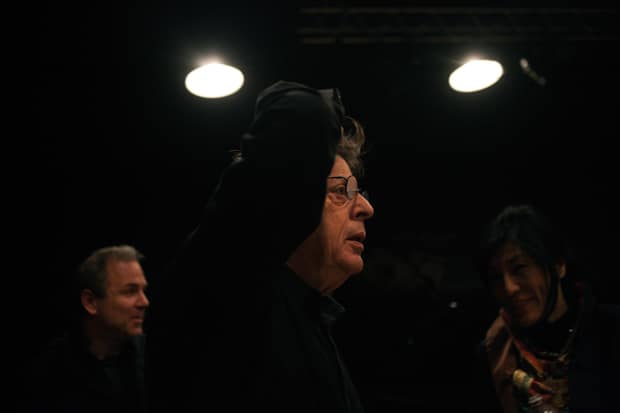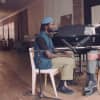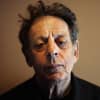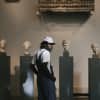 Philip Glass discusses 75 years of staying fresh.
Philip Glass discusses 75 years of staying fresh.
Dressed in a long sleeve black T-shirt and blue jeans, Philip Glass eases onto a couch in a corner room of his spacious Dunvagen studio. A few blocks away are the SoHo buildings where, nearly 50 years ago, Glass staged concerts in derelict lofts to air his maddeningly beautiful ideas about sound and rhythm. His venues have grown but still there’s a feisty independence and curiosity about him.
Running a hand through his trademark rebellious curls, Glass says, “We’re stealing this office for the afternoon. But it’s okay. I pay the rent.” The joke rings true: Glass is the boss around here, he just doesn’t act like one. The soft-spoken composer often slips from “I” to “we” while talking, the habit of a lifelong team player. Listening to him feels like hearing a cabbie hold court—naturally social, disarmingly unpretentious, happy to share observations on a pathway that is more important than the destination.
How many hours a day do you work on music? Well, it depends. A good day for me is eight to ten hours. An excellent day for me is 11 hours. A bad day is three hours. My bad days are most people’s good days. I go much further than them. Like, I was up this morning early, I took my kids to school, I spent two hours working, I’m talking to you, I’m going to go home, I have another meeting, then I’m going to work probably three to six, then I’ll be up to five hours, and then it’s six o’clock, then after dinner I’ll work another two or three hours. So this will be a seven or eight hour day.
Out of everything you’ve written, what’s your personal favorite? There’s a group of pieces that I did with Godfrey Reggio, the Qatsi films. I like the fact that he was bringing in a popular form and using it to discuss issues of social importance. And also Satyagraha, the opera about social change through nonviolence. I’ve done a lot of abstract pieces, symphonies, piano works, string quartets, but I think the ones that involve social issues have been particularly interesting for me.
When I read about your ensemble performances in the late ’60s and ’70s, people talk about volume and a very much in your face, immersive experience. How has that dynamic evolved over the years? Why did you choose to perform Music in Twelve Parts, a 38-year-old piece, at the Tune-In Festival? Well, Twelve Parts is a classic “loud” piece. I tried not to make [the Tune-In Festival, which included works and performances by many friends and collaborators], only myself and my music, it’s not that interesting to me. I hear it all the time. It’s like having a candy store with only one kind of candy. After a while, let’s get something else in the store. I have another festival that I’m doing out in California called the Days and Nights festival. I feature a guest composer every year. I’d like to get someone under 30. I think under 30 is—as my friends under 30 say—I think that’s cool. I like having young people around. I think they’re very interesting. Your magazine is about the digital age, and that is what this is about, very much about that. We’re now into a new musical language. By fate or by chance, my work fits into that. And for a strange reason.
Years and years ago in the ’60s, I was working as Ravi Shankar’s assistant. I became very familiar with his work, and I studied the rhythmic structure of classical North and South Indian music. And what I discovered was that the music was organized around groups of twos and threes. I was talking to a drummer from India recently, and I said, “‘Has it ever occurred to you that the rhythmic language of music is binary?” And he said, “What do you mean?” I said, “Twos and threes.” He said, “Yeah.” I said, “Ones and zeroes.” He said, “Yeah!” I said, “Binary language.” You can call it what you want to, but that’s what it is. Long strings of ones and zeroes. It turns out to be the best carrier of information. That’s why we like digital recordings. 1981, I did an analog and a digital recording at the same time. And we spent days afterwards listening to see what the difference was. It was a big deal in 1981.
Which was your preference? We went digital. The irony, meanwhile, is the analog has more warmth. The reasons, finally, came down to very subjective words. “Warmth,” “clarity,” things which are hard to quantify and to describe beyond the words themselves. They are adjectives where you try to hem in something through descriptive words, but you’re not actually talking about the things themselves. What we liked about the digital was that we could put more music on the record. I wasn’t even thinking about it as a digital language until I began noticing that young people still come to my concerts. I was thinking, Why is that? The expectation is that the audience gets older with the artist. You go to a Rolling Stones concert, there’ll be guys and girls in their 50s and 60s. If you go to a James Blake concert, there’ll be guys there in their 20s and 30s. As James Blake gets older, probably his audience will get older with him. And there’s something comforting about that. Generally speaking, my audience should be closer to my age than they are. They’re actually half my age.
How do you think that happened? Digital language. The structure of my music is familiar.
It hasn’t occurred to anybody, because people say, “Oh. Glass is a minimalist.” That’s the end of the discussion. But if they take the word away and say, “Well, what’s actually happening to the music?” and they actually start to look at it, they say, “Oh. It’s music based on a digital language.” It’s music that cycles and recycles through changes of a basic arithmetic element. If you look at Einstein on the Beach, which we’re doing again, is it really hard to count? I said, No, not really. If you can count to eight, you can count Einstein on the Beach. There’s a lot of different ways of counting to eight. You can do, “One-two-three-four-five-six-seven-eight,” you can do, “One-one-two-two-three-three-four-four-five-five-six-six-seven-seven-eight-eight,” I’d say the actual number of two to the eighth power would tell you how many different permutations there are—the mathematical formula for all the permutations of eight elements.
In addition to all the musical qualities, I think that one of the reasons young people are attracted to your music is the way you’ve worked—owning your own publishing, providing health care for the players in the ensemble, getting in a van and performing your works. Well, we were a little ahead of the curve on that. I began forming the ensemble in the ’60s. But by ’73 and ’74, I took it seriously as an economic and artistic structure—trying to make them work together. It’s a challenge, because the odd thing is—or maybe not so odd—I’ve never received public funding at all. We’ve had to make our money by playing. At first, that annoyed me. And then after a while, ten or 15 years, everyone got Guggenheims and MacArthurs and whatever they got. Whatever the prizes were, I didn’t get any. I think these people said, “Oh, Philip. He doesn’t need the money.” And they were right. I had another way of making a living. Owning the publishing was crucial, because I own a hundred percent of everything…not everything. There are a couple Hollywood scores which I don’t
own, because I own the composership. That’s the way Hollywood works. I’ve lost some of those.
What do you see as the future for musicians and visual artists?The whole struggle with intellectual property is going to come up when we talk about this. Because it gets down to, Who owns this and how do we pay artists for their work? Many young people would rather be involved with the commercial world and do their artwork and art music and support it by doing that. I understand because they have a larger share of real independence. Being independent is the main thing.
The more fundamental question is: how can I do my work and be supported economically and have my independence? Without the independence you’re not anybody. There’s a lot of economics involved in creative independence. I think it’s in this area that these things will be decided. A lot of young people are forming into groups. Three or four people start a company and they’re starting to work collectively. I worked with a collective theater many years ago and we actually almost made enough money to make a living. Almost. Still did a certain amount of housecleaning and dog walking and cab driving, but you can come a lot closer to it.
I stopped applying for grants 35 years ago because I never got anything. And it was fine. I just made a living a different way. You know, I’m independent. Take it away from me. Try. You’re not going to do it. I’m too old a dog to get a chain around at this point. It’s not going to happen. I was too old a dog when I was 21. I like the younger generation because I think they’re not interested in the normal forms of economic and artistic corruption that are always around. Between rent and health care, how do we survive that? It’s not easy. But the fact that we’ve been doing this—even if I quit right now, we would have done this for 40 years.
As things become more financially difficult for someone of your stature, how applicable is your pathway for a younger generation? In terms of the physical ways of working, there are a lot of new things that have happened in my lifetime. I’m talking about the digital technology that is available. I’m still writing with pencil and paper, let’s put it that way. A lot of composers are now working directly with computers. There’s a big change, both in music and in other areas too: in photography, projection, performance. We’re living in a digital world. However there are many things I do which are applicable. For one thing, develop an independence of work. I’m not connected to institutions, I’m connected to live performance and to working collectively. This is very much a part of my generation. We were not what you call “the establishment.” This independence made it possible for me to do things that were unusual, that people hadn’t done before. The idealism that was part of the way I worked—working really and truly for the development of a new language of performance, of music, without regards to a successful career or a commercial career of any kind—you can still do that!
I had wonderful parents. My mother was a school-teacher and my father had a small music shop—he didn’t make any money. So I didn’t have a family fortune behind me. I had my energy, and I had other people. When young people today ask, “How do we get started?” I say, Look around and find people your own age. Work with your own generation. Make alliances among artists of your own time and these will be the people that you’ll work with. Don’t expect help from the older ones, they’re not interested.



